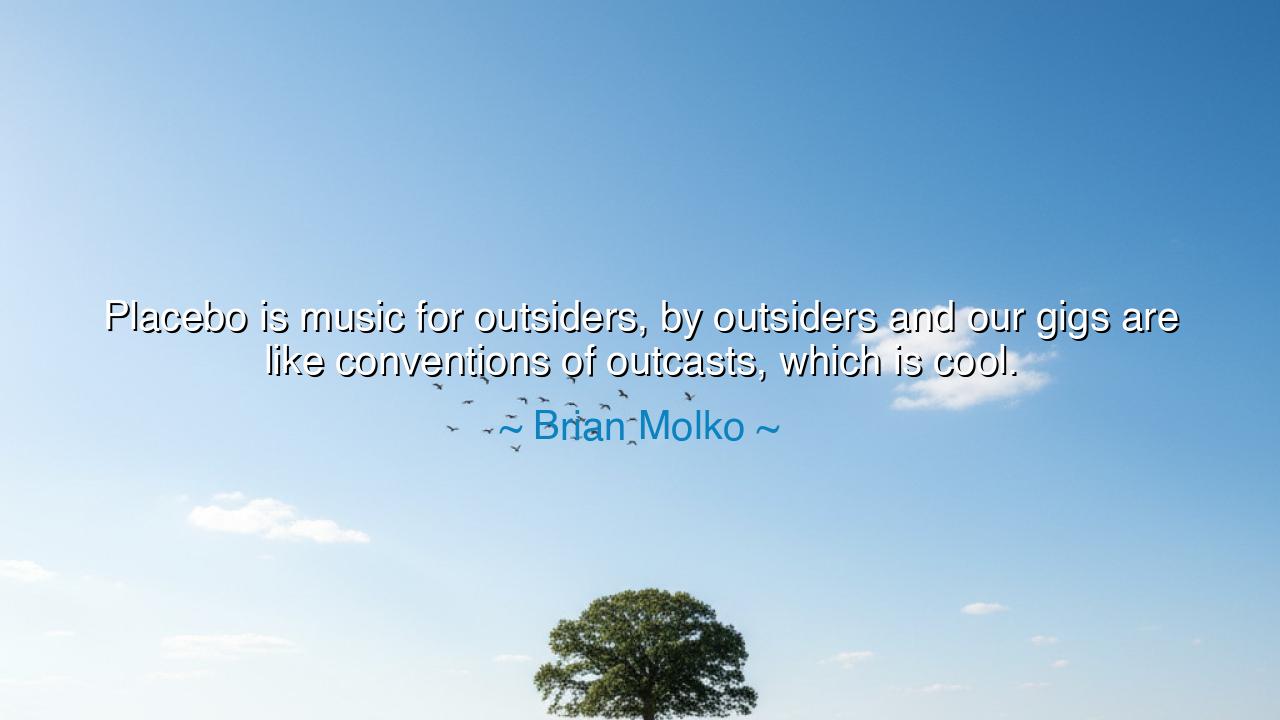
Placebo is music for outsiders, by outsiders and our gigs are
Placebo is music for outsiders, by outsiders and our gigs are like conventions of outcasts, which is cool.






When Brian Molko, the enigmatic voice of Placebo, proclaimed that “Placebo is music for outsiders, by outsiders, and our gigs are like conventions of outcasts, which is cool,” he uttered more than a statement about a band—he spoke an anthem for the misunderstood, a hymn for the exiled spirits of the modern world. His words ring like the sound of defiance wrapped in melody, the confession of one who knows the pain of alienation and transforms it into art. In this declaration lies a profound truth: that outsiders are not broken—they are the makers of worlds.
In every age, there have been those who walked apart from the crowd. The poets who refused the chains of convention, the painters who shattered form, the prophets who spoke to deaf ears. The ancient Greeks called them daimons—souls touched by something otherworldly, often misunderstood by those around them. Placebo’s music, born of anguish and beauty, follows in this sacred lineage. It is the cry of those who do not fit the molds society builds, and yet, in their difference, find an unspoken unity. Their gigs, as Molko says, are not mere performances—they are conventions of outcasts, gatherings where the marginalized are no longer alone, where loneliness becomes communion.
There is something deeply human, even heroic, in this embrace of the outsider. Consider the story of Vincent van Gogh, who lived in solitude and despair, his art rejected, his spirit ridiculed. He painted the world as he felt it, not as others demanded he see it. In life, he was shunned; in death, he became immortal. Like Placebo, van Gogh’s works are the music of outsiders—vivid, aching, defiant. Both remind us that what is rejected by the world is often what saves it.
To be an outsider is not a curse but a calling. It is to walk a path without maps, to listen to a rhythm no one else hears. The music of outsiders carries the fire of authenticity; it speaks to those who cannot pretend. When Molko sings, his voice trembling between anger and tenderness, he becomes a mirror for every soul that has ever felt unseen. His art does not invite pity—it offers belonging. He builds a temple where the broken can dance, where sorrow finds beauty, and where being different is not just accepted—it is sacred.
The ancients would say that such gatherings—the “conventions of outcasts”—are moments when the veil between souls grows thin. In them, the walls that divide fall away. The punk in torn boots, the girl with unspoken grief, the boy who hides his tears—all are joined in one heartbeat, one melody. It is a ritual of liberation, not from the world, but from the shame of not fitting into it. In that unity, the outcast becomes powerful, the wounded become wise, and the forgotten become free.
The lesson, then, is both fierce and tender: Do not flee from your strangeness. Cherish it. Let it be your melody. In a world obsessed with sameness, your difference is your truth. As Molko and his band teach through every note, authenticity is rebellion, and rebellion is beautiful. To live as an outsider is to live honestly, without masks—to speak in your own voice, even if it trembles.
So, let each of us find the courage to sing our own song. Seek those who understand your rhythm, even if they are few, for together you will form your own convention of outcasts, bound not by perfection but by truth. Celebrate what sets you apart, for that is the spark of creation within you.
For the wisdom of the ancients and the echo of Molko’s voice whisper the same eternal truth: the world may never understand the outsider, but it is the outsider who changes the world. Walk proudly in your difference. Turn your pain into music, your solitude into strength, and your otherness into art. Then, like Placebo, you will find your people—and together, you will make the night sing.






AAdministratorAdministrator
Welcome, honored guests. Please leave a comment, we will respond soon